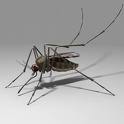West Nile now in B.C.
This article was submitted courtesy the Interior Health Authority
The presence of West Nile virus has been detected in B.C. for the first time ever, the province announced this week.
A mosquito pool sample collected from the south Okanagan tested positive for
the virus at the Provincial Health Services Authority Laboratories at the B.C.
Centre for Disease Control. At the same time, public health authorities are
investigating possible West Nile virus cases in two Kelowna residents who
had only travelled within the central and south Okanagan areas in the
Interior Health region.
All previously recorded cases of West Nile virus in BC have been travel-
related, acquired outside the province. Although the presence of West Nile
virus is now confirmed in B.C., people can take simple and sensible measures
to protect themselves and their families from being infected.
“This doesn’t really come as a surprise,” said Dr. Perry Kendall, B.C.
provincial health officer. “We have been anticipating the arrival of West
Nile virus in our province for several years now, especially considering
that infection has been widely reported in humans and animals in several
provinces across Canada and the U.S. in recent years, including
provinces and states bordering B.C. The important things to note are that
B.C. has a robust mosquito and West Nile virus surveillance system, and that
people can take common sense precautions to protect themselves from mosquito
bites.”
Dr. Bonnie Henry, medical director of the vector-borne disease program at
the B.C. Centre for Disease Control, an agency of the PHSA,
concurred.
“Since West Nile virus first appeared in Canada, the public has
consistently been advised to take sensible precautions to reduce exposure to
mosquitoes, especially when outdoors. This includes wearing light-coloured
long-sleeved shirts and long pants – especially in the evenings and early
mornings when mosquitoes are most active – and using mosquito repellents
that are federally registered, such as those that contain DEET and lemon
eucalyptus oil.”
Mosquito larvae like to live in warm, nutrient-rich standing water; even as
little as a teaspoon is enough. Surveying the outside of homes and buildings
will help to reveal those areas that need to be monitored and from where
standing water should be drained, especially from spring to fall.
“Even though we are late in August,” said Dr. Paul Hasselback, medical health
officer with the Interior Health Authority, “it would be prudent to ensure
that homes, gardens, backyards and indeed any open spaces near residential
and farm areas aren’t breeding grounds for mosquitoes. This and other basic
personal protection steps are sensible precautions that all of us should
take, and this is a public health message we have been reiterating year
after year.”
Since 2002, BCCDC and regional health authorities have been working with
local governments, the B.C. Animal Health Centre, wildlife officials,
entomologists, and other agencies to look for West Nile virus in B.C. This
includes an active monitoring and testing program for mosquitoes, humans,
and dead corvids (including crows, ravens, magpies, nutcrackers, Steller’s
jays and blue jays).
“There is no fixed pattern to West Nile virus,” said Kendall. “In some
years, a number of provinces have recorded hundreds of cases. This year,
however, there have been no reported cases in Canada. If confirmed, the two
cases currently being investigated in B.C. will be the first. But while the
incidence of West Nile virus fluctuates, what should remain a constant are
stringent surveillance and common sense personal protection. That’s our best
strategy against West Nile virus infection.”
West Nile Virus Background:
* West Nile virus is a mosquito borne illness that was first identified in
the West Nile Valley region of Uganda in 1937. The first cases in North
America appeared in New York in 1999.
* The usual way for humans to get West Nile virus is through the bite of an
infected mosquito.
* West Nile virus affects a range of animals, including horses. Horse owners
in BC are encouraged to talk to their veterinarians about the vaccine that
is available to protect their animals.
* Of people who are infected with West Nile virus, most will have no
symptoms at all. About 20 per cent will develop an illness with fever,
headaches and rash symptoms. In about 1 out of 150 cases, more severe
neurological complications can occur such as encephalitis (inflammation of
the brain) and meningitis (infection of the lining of the brain).
Protective Measures:
Here are many simple things you can do to protect yourself from West Nile
virus.
Unlike birds or other insects, most mosquitoes do not fly very far and tend
to stay close to their breeding sites. You are most likely to be bitten by a
mosquito from your own backyard.
* Clean up areas where mosquitoes like to breed. It doesn’t take much time
(generally one week), or water for mosquitoes to develop from eggs into
adults;
* Take a look around your home and get rid of mosquito-friendly places that
would make good breeding sites or resting places for mosquitoes.
* Remove any type of standing water at least once a week;
* Clean up and empty containers that collect water such as old tires, flower
pots, wheelbarrows, barrels, tin cans or even small containers like bottle
tops that are outdoors;
* Drill holes in the bottom of used containers so water can’t collect.;
* Change water in bird baths at least once a week;
* If you have a swimming pool, immediately remove water that collects on pool
covers and make sure the pool’s pump is circulating;
* Turn over wading pools when not in use;
* Check leaves and drains: don’t let things pile up;
* Clear leaves and twigs from eaves troughs, storm and roof gutters
throughout the summer;
* Check flat roofs frequently for standing water;
* Make sure drains and drainage ditches are not clogged;
* Stop mosquitoes from entering your home;
* Check windows and door screens for holes and make sure they fit snugly;
into the frames, so mosquitoes cannot get in.
How can I protect myself and my family when we are outdoors?
* If you can, avoid being out around dusk and dawn as mosquitoes that carry
West Nile virus tend to be active at these times;
* Wear protective clothing, especially outside in the early evening and at
dawn. This includes long-sleeve shirts or jackets and long pants that
mosquitoes cannot bite through;
Tuck your pants into socks for extra protection;
* Avoid dark coloured clothing as it can attract mosquitoes;
* Use mosquito netting for babies and toddlers in cribs and strollers;
* Use mosquito repellent. Putting on personal insect repellents that are
federally registered, such as those that contain DEET, is an effective way
to protect yourself from mosquito bites;
* There are also many repellents that have been shown NOT to protect against
mosquito bites, including bug zappers, devices that give off sound waves and
Citrosa plants;
* Tips when using insect repellent;
* Apply repellent sparingly on exposed skin or on top of clothing. Do not
use under clothing;
* The repellent doesn’t have to be applied heavily to work – a light coating
will do;
* Use your hands to rub the repellent over your skin after you spray it on;
Research shows that mosquitoes will find and bite even very small sections of
skin missed by the spray;
* Do not use repellent on open wounds, or if skin is irritated or sunburned;
* Do not get repellent in your eyes – if this happens, rinse with water
right away;
* Avoid breathing mist from spray-type repellent. Always apply in a well-
ventilated area; never apply spray repellent inside a tent;
* Do not use near food;
* Read the manufacturer’s instructions on the label carefully, including
restrictions for use on young children and maximum number of applications
per day.
Resources:
* BCCDC West Nile virus website:
http://www.bccdc.ca/dis-cond/a-z/_w/WestNileVirus/default.htm
* B.C. dead bird reporting form:
http://www.bccdc.ca/dis-cond/a-z/_w/WestNileVirus/Surveillance/WNvDeadBirdReporting.htm
* Public Health Agency of Canada West Nile virus website:
http://www.phac-aspc.gc.ca/wnv-vwn/index-eng.php
* U.S. CDC West Nile virus website:
http://www.cdc.gov/ncidod/dvbid/westnile/
* Interior Health West Nile Virus resources
http://www.interiorhealth.ca/health-and-safety.aspx?id=450


























Comments